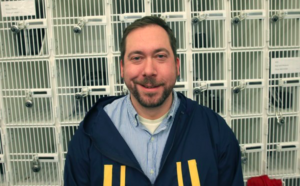AWKWARD APPOINTMENT
Gov. Bill Walker has named a Palmer woman who was a political field organizer for Planned Parenthood to a group that oversees the delivery of live births: the Board of Certified Direct-Entry Midwives.
Kenni Linden is a graduate of Palmer High School and Naropa University, a Buddhist-inspired school in Colorado.
Linden ran for Palmer City Council and was endorsed by the AFL-CIO Mat-Su coalition of unions, including Local 302, IBEW, MSBEA, and MSEA. She lost to Sabrena Combs.
Linden describes herself in her previous campaign material as a “fierce reproductive justice activist—I was a political field organizer with Planned Parenthood.”
Direct-entry midwives are those who come into the field through apprenticeship, rather than for a formal nursing program.
The Board consists of two direct-entry midwives, one physician, one certified nurse midwife, and one public member, which is the board seat that expires March 1, and the one to which Linden would be confirmed.
According to the state’s web site, the Board adopts regulations to carry out laws governing the practice of direct-entry midwifery in Alaska and makes licensing decisions. It also takes disciplinary action against people who violate the licensing laws.
Will Linden get confirmed by the House and Senate, or is her nomination considered to be red meat to attract Republican ire? Is the plan to make her the new Drew Phoenix (controversial nomination of 2017) to draw attention away from other appointees?
Speaker Bryce Edgmon referred the nomination to the, er, Labor and Commerce Committee.
[Read: Transgender dosn’t make cut for commission]
The complete list of Walker’s most recent appointments:
Commissioner – Department of Revenue
Sheldon Fisher
Appointed: September 7, 2017
Commissioner – Department of Administration
Leslie Ridle
Appointed: October 6, 2017
Commissioner – Department of Commerce, Community, and Economic Development
Mike Navarre
Appointed: November 1, 2017
Accountancy, Alaska State Board of Public
Leslie Schmitz – Anchorage
Appointed: 3/1/2018 Term Expires: 3/1/2022
Alcoholic Beverage Control Board
Sara Crapuchettes – Soldotna
Appointed: 3/1/2018 Term Expires: 3/1/2021
Rex Wilhelm – Anchorage
Appointed: 3/1/2018 Term Expires: 3/1/2021
Architects, Engineers and Land Surveyors, State Board of Registration for
William Mott – Anchorage
Appointed: 5/26/2017 Term Expires: 3/1/2020
Luanne Urfer – Eagle River
Appointed: 7/7/2017 Term Expires: 3/1/2021
Jennifer Anderson – Anchorage
Appointed: 3/1/2018 Term Expires: 3/1/2022
Richard Jones – Juneau
Appointed: 10/26/2016
Reappointed: 3/1/2018 Term Expires: 3/1/2022
Assessment Review Board, State
Bradley Pickett – Palmer
Appointed: 5/26/2017 Term Expires: n/a
Bar, Board of Governors of the Alaska
William Gordon – Salcha
Appointed: 8/15/2012 Reappointed: 3/1/2015
Reappointed: 3/1/2018 Term Expires: 3/1/2021
Barbers and Hairdressers, Board of
Vershawn Idom – Anchorage
Appointed: 3/1/2018 Term Expires: 3/1/2022
Big Game Commercial Services Board
Robert Beans – Palmer
Appointed: 1/29/2018
Reappointed: 3/1/2018 Term Expires: 3/1/2022
Adam Trombley – Anchorage
Appointed: 2/2/2017
Reappointed: 3/1/2018 Term Expires: 3/1/2022
Michelle Heun – Palmer
Appointed: 1/29/2018 Term Expires: 3/1/2021
Cash Joyce – Wasilla
Appointed: 1/29/2018 Term Expires: 3/1/2019
Chiropractic Examiners, Board of
James Morris – Dutch Harbor
Appointed: 3/1/2018 Term Expires: 3/1/2022
Commercial Fisheries Entry Commission, Alaska
Vance Fate Putman – Juneau
Appointed: 12/1/2017
Reappointed (to different seat): 1/29/2018 Term Expires: 3/1/2021
Carol Petraborg – Juneau
Appointed: 3/1/2018 Term Expires: 3/1/2022
Dental Examiners, Board of
Dominic Wenzell – Girdwood
Appointed: 3/1/2018 Term Expires: 3/1/2022
Robin Wahto – Anchorage
Appointed: 11/15/2017 Term Expires: 3/1/2021
Education and Early Development, Board of
James Fields – Glennallen
Appointed: 3/22/2013
Reappointed: 3/1/2018 Term Expires: 3/1/2023
Sandra Kowalski – Fairbanks
Appointed: 3/1/2018 Term Expires: 3/1/2023
Lorri Van Diest – Palmer
Appointed: 1/29/2018 Term Expires: 3/1/2020
Fishermen’s Fund Advisory and Appeals Council
Mark Saldi – Skagway
Appointed: 3/26/2008 Reappointed: 3/1/2013
Reappointed: 3/1/2018 Term Expires: 3/1/2023
Human Rights, State Commission for
Megan Mackiernan – Nome
Appointed: 8/18/2017 Term Expires: 3/1/2020
Christa Bruce-Kotrc – Ketchikan
Appointed: 8/1/2011
Reappointed: 3/1/2018 Term Expires: 3/1/2023
Freddie Olin IV – Anchorage
Appointed: 3/1/2018 Term Expires: 3/1/2023
Labor Relations Agency, Alaska
Tyler Andrews – Anchorage
Appointed: 6/9/2008 Reappointed: 3/1/2009
Reappointed: 3/1/2012 Reappointed: 3/1/2015
Reappointed: 3/1/2018 Term Expires: 3/1/2021
Melinda (Mila) Cosgrove – Juneau
Appointed: 1/3/2018 Term Expires: 3/1/2020
Lon Needles – Valdez
Appointed: 3/1/2015
Reappointed: 3/1/2018 Term Expires: 3/1/2021
Marijuana Control Board
Loren Jones – Douglas
Appointed: 7/1/2015
Reappointed: 3/1/2018 Term Expires: 3/1/2021
Nicholas Miller – Anchorage
Appointed: 8/19/2016
Reappointed: 3/1/2018 Term Expires: 3/1/2021
Travis Welch – Utqiagvik
Appointed: 1/19/2018 Term Expires: 3/1/2020
Marine Pilots, Board of
Peggy McLaughlin – Dutch Harbor
Appointed: 5/26/2017
Reappointed: 3/1/2018 Term Expires: 3/1/2022
Richard Harris – Juneau
Appointed: 12/18/2017 Term Expires: 3/1/2020
Les Cronk – Ketchikan
Appointed: 3/1/2018 Term Expires: 3/1/2022
Marital and Family Therapy, Board of
Natalie Lewis – Kotzebue
Appointed: 3/1/2018 Term Expires: 3/1/2022
Massage Therapists, Board of
David Edwards-Smith – Soldotna
Appointed: 1/19/2015
Reappointed: 3/1/2018 Term Expires: 3/1/2022
Jill Motz – Wasilla
Appointed: 1/23/2017
Reappointed: 3/1/2018 Term Expires: 3/1/2022
Medical Board, State
Sai-Ling Liu – Nome
Appointed: 3/1/2014
Reappointed: 3/1/2018 Term Expires: 3/1/2022
Catherine Hyndman – Dillingham
Appointed: 12/18/2017 Term Expires: 3/1/2020
Mental Health Trust Authority Board of Trustees, Alaska
Mike Powers – Fairbanks
Appointed: 3/1/2018 Term Expires: 3/1/2023
Verné Boerner – Anchorage
Appointed: 3/1/2018 Term Expires: 3/1/2023
Midwives, Board of Certified Direct-Entry
Kenni Linden – Palmer
Appointed: 3/1/2018 Term Expires: 3/1/2022
Dianna Kristeller – Fairbanks
Appointed: 12/18/2017 Term Expires: 3/1/2021
Nursing, Board of
Starla Fox – Dillingham
Appointed: 5/26/2017
Reappointed: 3/1/2018 Term Expires: 3/1/2022
Linda Hutchings – Soldotna
Appointed: 1/24/2018
Reappointed: 3/1/2018 Term Expires: 3/1/2022
Optometry, Board of Examiners in
Damien Delzer – Fairbanks
Appointed: 3/1/2014
Reappointed: 3/1/2018 Term Expires: 3/1/2022
Eric Lingle – Juneau
Appointed: 3/1/2014
Reappointed: 3/1/2018 Term Expires: 3/1/2022
Parole, State Board of
Sarah Possenti – Fairbanks
Appointed: 4/1/2011 Reappointed: 3/1/2013
Reappointed: 3/1/2018 Term Expires: 3/1/2023
Personnel Board
Alfred Tamagni, Sr. – Anchorage
Appointed: 3/1/2006
Reappointed: 3/1/2018 Term Expires: 3/1/2024
Pharmacy, Board of
Tammy Lindemuth – Anchorage
Appointed: 1/24/2018 Term Expires: 3/1/2021
Sharon Long – Anchorage
Appointed: 3/1/2018 Term Expires: 3/1/2022
Lana Bell – Anchorage
Appointed: 5/31/2016
Reappointed: 3/1/2018 Term Expires: 3/1/2022
Physical Therapy and Occupational Therapy Board, State
Keith Poorbaugh – Palmer
Appointed: 5/26/2017
Reappointed: 3/1/2018 Term Expires: 3/1/2022
Robert Calhoon – Anchorage
Appointed: 3/1/2018 Term Expires: 3/1/2022
Police Standards Council, Alaska
Michael Craig – Anchorage
Appointed: 5/26/2017
Reappointed: 3/1/2018 Term Expires: 3/1/2022
Justin Doll – Anchorage
Appointed: 8/18/2017 Term Expires: 3/1/2021
David Knapp – Palmer
Appointed: 1/24/2018
Reappointed: 3/1/2018 Term Expires: 3/1/2022
Professional Counselors, Board of
Steven Cardwell – Fairbanks
Appointed: 11/15/2017 Term Expires: 3/1/2021
Janece Richard – Anchorage
Appointed: 3/1/2018 Term Expires: 3/1/2022
Alice Baum – Anchorage
Appointed: 3/1/2018 Term Expires: 3/1/2022
Professional Teaching Practices Commission
Diane Kardash – North Pole
Appointed: 5/26/2017
Reappointed: 3/1/2018 Term Expires: 3/1/2021
Phillip Graham – Soldotna
Appointed: 3/1/2018 Term Expires: 3/1/2021
Kent Runion – Nome
Appointed: 11/18/2016
Reappointed: 3/1/2018 Term Expires: 3/1/2021
Public Offices Commission, Alaska
Anne Helzer – Anchorage
Appointed: 3/1/2018 Term Expires: 3/1/2023
Real Estate Appraisers, Board of Certified
Donald Faulkenburry – Anchorage
Appointed: 5/26/2017 Term Expires: 3/1/2019
David Derry – Kenai
Appointed: 3/1/2014
Reappointed: 3/1/2018 Term Expires: 3/1/2022
Wendy Lawrence – Sitka
Appointed: 3/1/2018 Term Expires: 3/1/2022
Regulatory Commission of Alaska
Janis Wilson – Anchorage
Appointed: 4/10/2006
Reappointed: 3/1/2018 Term Expires: 3/1/2024
Paul Lisankie – Anchorage
Appointed: 1/31/2018 Term Expires: 3/1/2019
Social Work Examiners, Board of
Lisa Hay – Fairbanks
Appointed: 1/24/2018 Term Expires: 3/1/2021
Danielle LaFon – Fairbanks
Appointed: 3/1/2014
Reappointed: 3/1/2018 Term Expires: 3/1/2022
Veterinary Examiners, Board of
Chris Michetti – Anchorage
Appointed: 3/1/2018 Term Expires: 3/1/2022
Violent Crimes Compensation Board
Jeffrey Stubblefield – Eagle River
Appointed: 1/23/2017
Reappointed: 3/1/2018 Term Expires: 3/1/2021
Workers’ Compensation Appeals Commission
Michael Notar – Juneau
Appointed: 9/24/2015
Reappointed: 3/1/2018 Term Expires: 3/1/2023
Workers’ Compensation Board, Alaska
Bradley Evans – Anchorage
Appointed: 5/26/2017 Term Expires: 3/1/2019
David Kester – Anchorage
Appointed: 7/7/2017 Term Expires: 3/1/2019
Justin Mack – Anchorage
Appointed: 1/29/2018
Reappointed: 3/1/2018 Term Expires: 3/1/2021
Chad Bolduc – Juneau
Appointed: 3/1/2018 Term Expires: 3/1/2021
Nancy Shaw – Anchorage
Appointed: 12/18/2017 Term Expires: 3/1/2020
Jacob Howdeshell – North Pole
Appointed: 3/1/2015
Reappointed: 3/1/2018 Term Expires: 3/1/2021
Bronson Frye – Anchorage
Appointed: 3/1/2018 Term Expires: 3/1/2021
Robert Weel – Anchorage
Appointed: 1/23/2006 Reappointed: 3/1/2006
Reappointed: 3/1/2012 Reappointed: 3/1/2015
Reappointed: 3/1/2018 Term Expires: 3/1/2021
Pamela Cline – Wasilla
Appointed: 9/21/2012 Reappointed: 3/1/2015
Reappointed: 3/1/2018 Term Expires: 3/1/2021
Also, in accordance with AS 18.85.030, the Governor submits the following name for legislative confirmation.
Public Defender
Quinlan Steiner – Anchorage
Appointed: 10/13/2005
Reappointed: 10/13/2009 Reappointed: 10/13/2013
Reappointed: 10/13/2017 Term Expires: 10/13/2021







